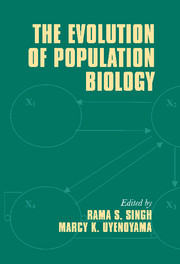Book contents
- Frontmatter
- Contents
- List of contributors
- Publications of R. C. Lewontin
- Preface
- Introduction
- Part I Historical foundations and perspectives
- Part II Genotypes to phenotypes: new genetic and bioinformatic advances
- Part III Phenotypes to fitness: genetics and ecology of populations
- Part IV Genes, organisms, and environment: evolutionary case studies
- 14 Adaptation, constraint, and neutrality: mechanistic case studies with butterflies and their general implications
- 15 Evolution in hybrid zones
- 16 Nine relatives from one African ancestor: population biology and evolution of the Drosophila melanogaster subgroup species
- Part V Applied population biology: biodiversity and food, disease, and health
- Index
14 - Adaptation, constraint, and neutrality: mechanistic case studies with butterflies and their general implications
Published online by Cambridge University Press: 08 January 2010
- Frontmatter
- Contents
- List of contributors
- Publications of R. C. Lewontin
- Preface
- Introduction
- Part I Historical foundations and perspectives
- Part II Genotypes to phenotypes: new genetic and bioinformatic advances
- Part III Phenotypes to fitness: genetics and ecology of populations
- Part IV Genes, organisms, and environment: evolutionary case studies
- 14 Adaptation, constraint, and neutrality: mechanistic case studies with butterflies and their general implications
- 15 Evolution in hybrid zones
- 16 Nine relatives from one African ancestor: population biology and evolution of the Drosophila melanogaster subgroup species
- Part V Applied population biology: biodiversity and food, disease, and health
- Index
Summary
Introduction
I've known Dick Lewontin since the early 1960s. Hardly a month has passed in that time in which I've not made use of one or another of his contributions to evolutionary biology. That does not mean, as “the literature” bears witness, that he and I have always been in agreement! But we have been deeply interested in many of the same questions. So, it is a pleasant challenge for me to recount here some work on evolutionary processes that I and my associates have done. The mechanistic study of evolution, as we understand it, entails a central focus on adaptation, i.e., on organism–environment interactions, as a basis for predicting demographically based fitness outcomes (or their absence). Thus I begin by stating our views of the place of adaptation in the evolutionary process. I next turn to illustrative empirical examples from our work, and then to discussion of some general evolutionary questions of common interest, whose answers these examples illuminate.
The adaptation concept and its role in the study of evolution
Adaptation, correctly understood, refers to the suitedness of heritably varying phenotypes to the range of environments they occupy, and hence to these phenotypes differential performance of biological function in those environments (Watt 1994, 2000, 2001).
Information
- Type
- Chapter
- Information
- The Evolution of Population Biology , pp. 275 - 296Publisher: Cambridge University PressPrint publication year: 2004
Accessibility standard: Unknown
Why this information is here
This section outlines the accessibility features of this content - including support for screen readers, full keyboard navigation and high-contrast display options. This may not be relevant for you.Accessibility Information
- 5
- Cited by
